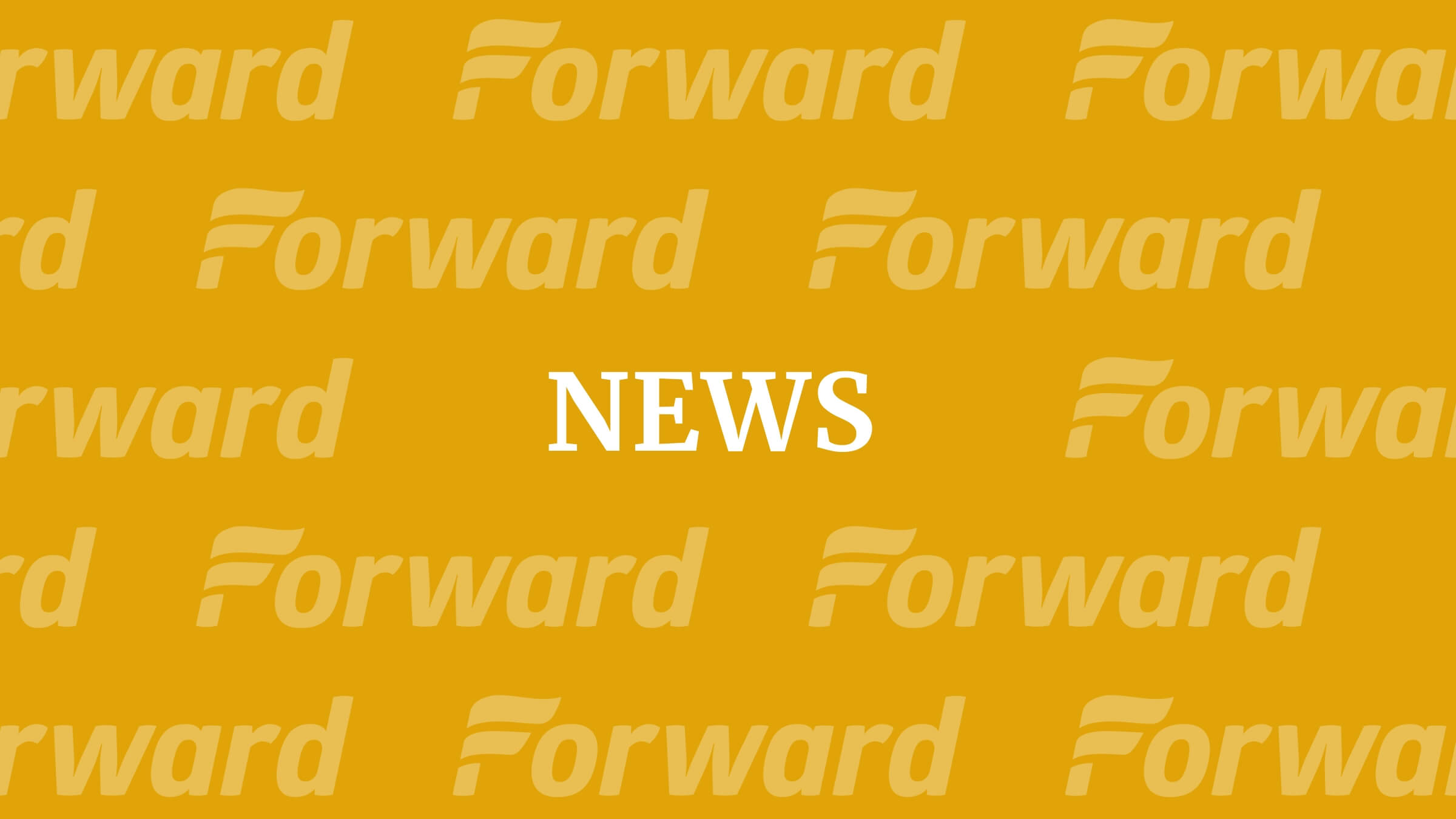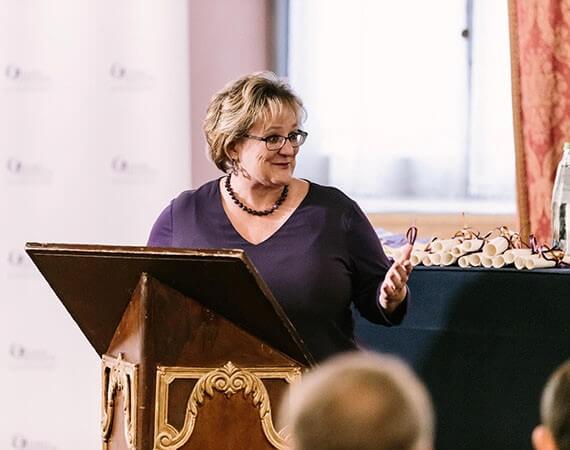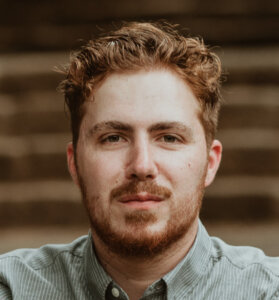‘A Holocaust Memorial Day Macy’s sale’: Jewish faculty boycott James Madison University Holocaust event
Two dozen current and past Jewish James Madison faculty and staff sent a letter to the university president to inform him of the boycott

Graphic by Angelie Zaslavsky
A group of Jewish faculty and local synagogue members boycotted a Holocaust commemoration event at James Madison University Thursday evening. Jewish members of the organizing committee resigned earlier this month over a planned musical section they deemed too celebratory for the occasion and other concerns. The performance was to include the school’s provost, Heather Coltman, who is also a concert pianist, although a university official said she bowed out at the last minute.
Rabbi Jeffrey Kurtz-Lendner, who leads Beth El Congregation in Harrisonburg, Virginia, where the school is located, said that the Jewish faculty and staff on the committee were rebuffed.

“They were told, ‘Well, this is what it is, we don’t care what you have to say,’” Kurtz-Lendner said in an interview.
Kurtz-Lendner wrote a letter to Jonathan Alger, the university’s president, Wednesday, objecting to the program.
Malika Carter-Hoyt, chief diversity officer of the university, said in a statement that officials were unaware of concerns about the event. “This event is to create an opportunity for people to learn about the lived experiences of others and honor the Holocaust Remembrance Day through educational and solemn means,” she said.
A program for the Thursday evening event described it as “an evening conversation on the history and legacy of the Holocaust.” In addition to lectures on “Lessons and Legacies of Auschwitz,” and “Antisemitism and White Supremacy,” it also featured a section called “Music as Refuge in the Holocaust” performed by Coltman and Jo-Anne van der Vat-Chromy, a member of the music faculty.
On Friday, Mary-Hope Vass, a university spokesperson, described Vat-Chromy as an “award-winning Holocaust scholar.” although her faculty biography said her research focuses on musical pedagogy. Vass said Coltman decided not to participate in the performance but “removed herself from the programming out of respect to the concerns recently reviewd.”
Kurtz-Lendner said that too much emphasis was placed on the musical selections, and that Alan Berger, a Florida Atlantic University professor, had been asked to limit his remarks on Auschwitz to ten minutes.
“The whole program is designed to use the Holocaust as an opportunity for the university to have a celebration,” said Kurtz-Lender, whose Reform congregation has about 70 member families. “It’s basically a Holocaust Memorial Day Macy’s sale.”
Vass, who did not respond to questions before the event Thursday, said that because the Holocaust event was “academic,” and “not intended for the community at large,” the planning committee was selected based on “substantive expertise” and not on whether or not they were Jewish.
Coltman’s office referred questions to Narketta Sparkman-Key, assistant provost for diversity, who did not immediately respond. It was not clear what pieces were performed.
Josh Shulruff, staff advisor for JMU Hillel, said he was one of the three Jewish members of the planning committee who resigned in early January over concerns with the event. Shulruff said in an email Friday that Jewish members of last year’s committee were excluded from the 2023 planning process after they objected to Coltman performing, and did not select Berger as a speaker.
Vass said that only one member of the planning committee resigned, although Shulruff provided a resignation letter to the Forward sent on behalf of himself and two other Jewish members of the committee. He said that the other two members wished to remain anonymous.
“It is unfortunate and unfair that individuals have issued these concerns anonymously, while personally attacking their colleagues,” Vass said. “At JMU we strive to create and teach an inclusive culture through respectful civil discourse.”
Letter announces boycott
Two dozen current and past James Madison faculty and staff, who did not list their names, sent a letter to Alger, the president, announcing that they would boycott the event. The undated letter was republished by the Breeze, the school’s student newspaper, Thursday morning.
“I’ve had several people say to me, ‘Oh, I’m gonna go to the thing on Thursday. See you there,’ and my answer, of course, is, ‘Thank you, you know, I’m not attending,’” Maura Hametz, who runs the history department at James Madison and was one of the Jewish faculty who signed the letter, told the Breeze.
Hametz told JTA she had successfully blocked a musical performance last year on the grounds that Jewish tradition prohibits instrumental music in times of mourning.
Vass sent a statement defending the event from Berger, director of the Center for the Study of Values and Violence After Auschwitz at Florida Atlantic University.
“The program was inclusive, somber, reflective, academic, and appropriate,” Berger said. ” In my nearly half-century as a Holocaust and Jewish Studies scholar, this event was reflective of the integrity of academic and Jewish commemorations on the Holocaust.”
Berger said the musical portion of the event was “sensitive to Jewish culture, educational, and exemplified the very best in understanding the relationsunhip between the particular and universal when bearing witness to the impact of the Holocaust.”
He said that Vat-Chromy had received the “Righteous Among Nations Service Award for Cultural Outreach Through Music Award” from Yad Vashem, the Israeli Holocaust memorial museum.
Coltman was dean of the humanities at Florida Atlantic until 2017.
She has repeatedly clashed with faculty at James Madison over unrelated issues, including allegations from the Faculty Senate that she “exacerbated a culture of fear and systemic intimidation” on campus.
Program sparks controversy
The event program states that it was sponsored by the Gandhi Center for Global Nonviolence on campus, but director Taimi Castle told the Breeze that the center’s representative had pulled out of the planning process in October and she would have withdrawn support if she had been aware of the concerns.
The program also lists Randi Nagel, rabbi of Temple House of Israel in neighboring Staunton as offering a “community welcome,” but Kurtz-Lendner said Nagel pulled out after he informed her of the local concerns.
“I am not participating,” Nagel said in an email. “I was not able to attend.”
Kurtz-Lendner said that Sparkman-Key, who is also speaking at the event, had alienated some members of the Jewish community by writing on social media during a visit to Israel that Jesus had parted the Red Sea.
Sparkman-Key, who frequently invokes God on Twitter, did not immediately respond to a request for comment.
After this article’s initial publication, Vass, the university spokesperson, contacted the Forward and said Sparkman-Key had never traveled to Israel. And in mid-February, a lawyer representing Sparkman-Key emailed the Forward a screenshot of a Tweet dated in December in which Sparkman-Key posted two photos of the Red Sea from an Egyptian hotel with the message, “I took a moment to visit the Red Sea that was parted by Moses.”
Zach Ginsberg, vice president of the JMU Hillel, is also listed on the program reading a poem.
“I want everyone to know that I fully support Zach’s decision,” Shulruff said. He’s a mensch, and he’s navigated a difficult situation wisely, keeping JMU Hillel out of university politics without burning any bridges.”
Hillel estimates that James Madison has approximately 1,200 Jewish students, which would account for 6% of the public university’s total student population. Harrisonburg, a community of 50,000 about 130 miles southwest of Washington, D.C, has a small Jewish community. In addition to Beth El Congregation, James Madison has a Chabad house.
Shulruff said there was a strong Jewish community on campus, and pointed to Center for Multicultural Student Services’ support for the JMU Hillel Hanukkah party this year.
“To any JMU students reading this (probably on your phones, hopefully not in class), I want you to know that there are supportive folks on campus,” Shulruff said in an email. “I want you to know that more than two dozen Jewish faculty and staff are here for you if you need us.”


















